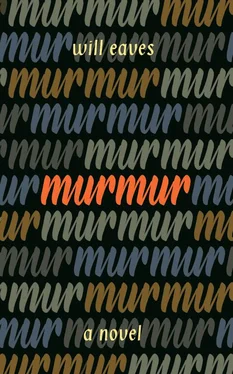Well, I had to think. Of course I’ve given some thought to the advantages (and disadvantages) of function divorced from feeling. As which of us has not? After all, beyond a certain point in life, one does not want to go on being hurt. Still, our joshing presented this “natural” instinct for self-preservation in another light, and I began to have a sense of many aspects of my life as, indeed, some kind of overcompensation—for the loss of C.C.M., I mean, which was to others at the time no more than the loss of a friend.
If I were to put it in my own terms of the period, Chris’s death and the whole routine of burial were the set of “instructions” I received. And what I made of them constituted a changed “state of mind.” I changed, I think, from someone into some thing . A something that had lost a soul mate—maybe even a soul.
Talking it over with A.S. reminded me of an evening with Chris, when he’d already won his scholarship to Trinity and I had yet to make an impression on King’s, or anywhere else for that matter. We were on the river. I was punting, sending the boat first too far to the right and then too far to the left, never in a straight line. Chris said I overcompensated, trying to correct a wrong steer, and I, being distractible, said that there was something in that—that I was convinced there existed some law of overcompensation in motion—which I should like to go into properly some day. So I took us into a tree and Chris and I ended up in the water. I went back to Wargrave. The next I heard was from Edith Molyneaux, his mother. Chris suffered from TB, about which I knew nothing. He was a very fair-skinned boy, that’s all I’d ever thought, and by this point it was a fairness invested by me with his own integrity and delicacy of mind. It seemed to me a definite strength and not a weakness. One wanted to be more like him. He had an attack on the way home from Cambridge, went to hospital, and died. Much later on, Edith told me he’d been in great pain for six whole days before the end.
Soon after Chris died, a boy at school stole my locked diary. He never divulged the diary’s contents, which were hardly shocking—positions of stars, Euclidean parallels, “neutral” records of chemistry experiments, his (Chris’s) attempts to get me to listen to Beethoven—but I was outraged. I read it the other day. There is one mention of my hand brushing against Chris’s while we were hanging a pendulum. I suppose I might have blushed for that. I’m sorry to say that I beat that boy rather hard.
At Bletchley, too, didn’t we overcompensate for the extra rotor the Germans put in the machine? All that work! All the work, June, it requires to be sure!
I have been dreaming of Chris every night since that last session with A.S., and of course it strikes me forcibly that these dreams are themselves a coded overcompensation, the price paid for a suppressed reality. But—and this is what the man in the mirror appears to be saying—perhaps it is not that way round. Perhaps it is not the code of the dream that has to be broken. Perhaps the dream is not a result of suppression, or anything like that—but is itself a set of instructions, which makes possible the next bit of life.
Sleep allows us to go away and forget about work, and dreams are the way in which we tell ourselves in the meantime how to pick up the thread. A dream is a stored program. A dream configures me. I wake into a new function.
My dreams are candid with me: they say I am chemically altered. They are full of magical symbolism! At the same time, they are enormously clear—where there is high reason and much thought, there will be much desire and many imaginings. Urges. I can be given drugs and hormones but they will only work as drugs and hormones work. They cannot get at the excess desire. Take out libido and another drive replaces it. Materialism and determinism define me through and through, and yet there is more than they allow. And if that illusion of more—call it free will—is itself a mere effect, then an “effect” suggests, does it not, a real cause, as a film “suggests” a projector?
When I dream, I am observing myself. Then I come back into myself when I open my eyes and I wonder what I’ve done, where I’ve been. In the latest installments, Stallbrook got transposed into a schoolmaster, as far as I can recall, and I acquired strange powers. But do I come back, June? Or is a trace of me left in that other world? Does something of the dreamer come back into this one? What of the dead, in dreams? They speak, but are they just my projections, or do they also exist? Do they project?
My breasts at least do not. Though that is the fault of expectation. (Because one does not expect a man to have breasts, they do not appear to resemble them. They are flattish, pouch-like, and red; the nipples enlarged, oblate.) I asked Trentham if he would like to see them, and he fairly ran off. I can’t say that I blame him.
I am afraid of becoming something else. A hybrid. The fear is not the change, it is the loss of, well, one’s personal past. It is quite like the fear of becoming a machine, in fact. I grieve for Chris now in a way I could not before, and it is precious to me, this new old grief. I fear losing him again in losing myself. I know what you will say. You’ll say, Alec, the “I” is always there. The “I” does not disappear if you change its data or its sex—its experiences and memories. It is there in the background, the ground stuff. And even if a clever doctor were able gradually to mechanize it all, and erase my past, he would not have killed me. It’s Russell’s “neutral stuff” of the mental and physical worlds, isn’t it, but oh, June, it is no neutral matter being caught between them!
In distress, A.
It may be that the feeling of free will which we all have is an illusion. Or it may be that we really have got free will, but yet there is no way of telling from our behaviour that this is so… I do not know how we can ever decide between these alternatives…
—A. M. Turing, “Can Digital Computers Think?” (1951)
The Class of All Unthinkable Things
Dear Alec,
Well, you’re right. I would say that you’re you, whatever ghastly things have happened or are happening, and the reason I know that is that I have letters from you, every week, despite everything, which are full of the Alec I know.
Your last letter worries me only in that it is pretty unguarded and, given your predicament, I should be a poor friend if I didn’t say: be careful. I am not surprised you feel your dreams leaking into your waking life, but perhaps stay out of Trentham’s way? He is your work colleague and colleagues talk. Remember, the Stilboestrol you’re taking—being given—is poisonous. Bill says he thinks the effects are probably reversible. You mustn’t think too far ahead. I know that’s easy for me to say.
Of course I’m playing devil’s advocate. You’ve always been honest with me, Alec, and that hasn’t always been easy. Not even Bill has your candor and intuition. Few have. I think your Dr. Stallbrook is fortunate in his patient. (You make me laugh when you say mirror-man has turned him into a schoolmaster. Imagine me telling the nuns my dreams! I think it would be very dull for them. Last night I dreamt that I was eating a potato in a garden. I recall, or make believe I recall, being frustrated by the situation.)
So, you worry about the people and the things you see at night, and whether you are turning into someone different. I wonder if you would worry as much if it were a transformation chosen by you and under your control. I think what’s frightening about your punishment is precisely that it’s so dreamlike—you can’t snap out of it. It disturbs me that you have to go somewhere and be injected, like a patient who’s really a prisoner. It doesn’t make sense. How can you be the blameless sufferer from a condition and a criminal—and a sinner—at the same time?
Читать дальше












